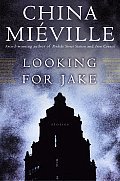
Saturday, October 29th, 2005.
Looking for Jake: Stories by China Mieville.
A Review by Doug Brown.
If you haven't read China Miéville's rich, wonderful Perdido Street Station, stop reading right now, get a copy, and read it. I mean it.

I mean it. He has an amazing ability to create dystopian worlds where things are somehow off-kilter, populate the worlds with strange and fascinating characters, add a dollop of chaos and entropy, and let them careen where they will, with steam and oil spurting out from the ill-fitting seams. Calling his work science fiction doesn't really describe it; it's more events taking place in worlds that are distinctly other, and yet somehow not. Looking for Jake is a collection of fourteen stories that should appeal to anyone who sees the world through a glass darkly. The title story is about a man suddenly alone in a world still populated with people. "Foundation" is about a building inspector who listens to the bodies of those buried under the world. "Familiar" is about a witch who truly creates a familiar, an oozing blob of flesh that learns about the world by sucking it in and incorporating what it needs.
"Reports of Certain Events in London" is a collection of papers from an organization who studies feral streets, lanes which move about at their whim. "Details" concerns a woman who one day realizes the devil really does live in the details. In "Different Skies" a man buys an antique window that looks out onto a different London than his other windows. "Jack" is the only story which takes place in New Crobuzon (the world of Miéville's previous books Perdido Street Station, The Scar, and Iron Council), a tale of Jack Half-a-Prayer. "On the Way to the Front" is a short graphic-novel story, a cryptic tale of soldiers on public transportation.
Miéville creates fantastic images that sear and scar and gnaw. Here's a sentence from the story "Looking for Jake": I've seen the trains go by with howling faces in all the windows, too fast to see clearly, something like dogs, I've seen trains burning with cold light, long slow trains empty except for one dead-looking woman staring directly into my eyes, en route Jesus Christ knows where. Or this from "Familiar": It found a nest of mice and examined their parts. Their tails it took for prehensile tentacles; their whiskers bristled it; it upgraded its eyes and learned to use ears. It compared what it found to dust, blades, water, twigs, fish ribs, and sodden rubbish: it learned mouse. Or from "Details": It lurks before us, in the everyday. It's the boss of all the things hidden in plain sight. Terrible things, they are. Appalling things. Just almost in reach. Brazen and invisible.Two UK-isms that I had to look up: A "Wendy House" is the UK term for those little playhouses that a couple of kids can fit inside of, commonly found on playgrounds and in the playrooms of malls and fast food establishments. It is named after the scene in Peter Pan when the Lost Boys build a little house around Wendy. A "crèche" is what is called a nursery in America, particularly a day-care type nursery.As with any story collection, there are a couple of entries that don't have quite the impact of others. However, this is overall a very solid collection of really good stories. I was a bit afraid this would be a collection of "formative early works" just to cash in on Miéville's newfound celebrity, but no worries. If you loved Perdido Street Station, then get this. Each story creates a world as different and other as New Crobuzon. Call it fantabulist, call it supernatural noir, or just call it damn good imaginative writing, China Miéville has given us another pulsating lump of snaggle-toothed gold.
Copyright © 1994-2005 Powells.com · Terms of Use

No comments:
Post a Comment